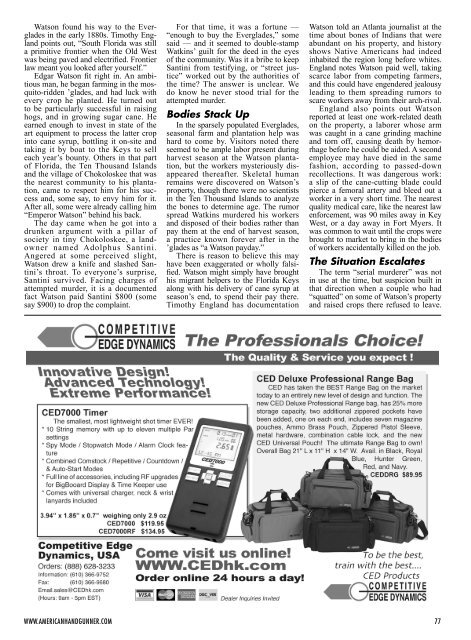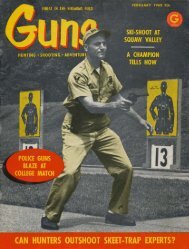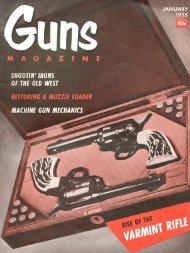American Handgunner Jul/Aug 2011 - Jeffersonian
American Handgunner Jul/Aug 2011 - Jeffersonian
American Handgunner Jul/Aug 2011 - Jeffersonian
You also want an ePaper? Increase the reach of your titles
YUMPU automatically turns print PDFs into web optimized ePapers that Google loves.
Watson found his way to the Everglades<br />
in the early 1880s. Timothy England<br />
points out, “South Florida was still<br />
a primitive frontier when the Old West<br />
was being paved and electrified. Frontier<br />
law meant you looked after yourself.”<br />
Edgar Watson fit right in. An ambitious<br />
man, he began farming in the mosquito-ridden<br />
’glades, and had luck with<br />
every crop he planted. He turned out<br />
to be particularly successful in raising<br />
hogs, and in growing sugar cane. He<br />
earned enough to invest in state of the<br />
art equipment to process the latter crop<br />
into cane syrup, bottling it on-site and<br />
taking it by boat to the Keys to sell<br />
each year’s bounty. Others in that part<br />
of Florida, the Ten Thousand Islands<br />
and the village of Chokoloskee that was<br />
the nearest community to his plantation,<br />
came to respect him for his success<br />
and, some say, to envy him for it.<br />
After all, some were already calling him<br />
“Emperor Watson” behind his back.<br />
The day came when he got into a<br />
drunken argument with a pillar of<br />
society in tiny Chokoloskee, a landowner<br />
named Adolphus Santini.<br />
Angered at some perceived slight,<br />
Watson drew a knife and slashed Santini’s<br />
throat. To everyone’s surprise,<br />
Santini survived. Facing charges of<br />
attempted murder, it is a documented<br />
fact Watson paid Santini $800 (some<br />
say $900) to drop the complaint.<br />
For that time, it was a fortune —<br />
“enough to buy the Everglades,” some<br />
said — and it seemed to double-stamp<br />
Watkins’ guilt for the deed in the eyes<br />
of the community. Was it a bribe to keep<br />
Santini from testifying, or “street justice”<br />
worked out by the authorities of<br />
the time? The answer is unclear. We<br />
do know he never stood trial for the<br />
attempted murder.<br />
Bodies Stack Up<br />
In the sparsely populated Everglades,<br />
seasonal farm and plantation help was<br />
hard to come by. Visitors noted there<br />
seemed to be ample labor present during<br />
harvest season at the Watson plantation,<br />
but the workers mysteriously disappeared<br />
thereafter. Skeletal human<br />
remains were discovered on Watson’s<br />
property, though there were no scientists<br />
in the Ten Thousand Islands to analyze<br />
the bones to determine age. The rumor<br />
spread Watkins murdered his workers<br />
and disposed of their bodies rather than<br />
pay them at the end of harvest season,<br />
a practice known forever after in the<br />
’glades as “a Watson payday.”<br />
There is reason to believe this may<br />
have been exaggerated or wholly falsified.<br />
Watson might simply have brought<br />
his migrant helpers to the Florida Keys<br />
along with his delivery of cane syrup at<br />
season’s end, to spend their pay there.<br />
Timothy England has documentation<br />
Watson told an Atlanta journalist at the<br />
time about bones of Indians that were<br />
abundant on his property, and history<br />
shows Native <strong>American</strong>s had indeed<br />
inhabited the region long before whites.<br />
England notes Watson paid well, taking<br />
scarce labor from competing farmers,<br />
and this could have engendered jealousy<br />
leading to them spreading rumors to<br />
scare workers away from their arch-rival.<br />
England also points out Watson<br />
reported at least one work-related death<br />
on the property, a laborer whose arm<br />
was caught in a cane grinding machine<br />
and torn off, causing death by hemorrhage<br />
before he could be aided. A second<br />
employee may have died in the same<br />
fashion, according to passed-down<br />
recollections. It was dangerous work:<br />
a slip of the cane-cutting blade could<br />
pierce a femoral artery and bleed out a<br />
worker in a very short time. The nearest<br />
quality medical care, like the nearest law<br />
enforcement, was 90 miles away in Key<br />
West, or a day away in Fort Myers. It<br />
was common to wait until the crops were<br />
brought to market to bring in the bodies<br />
of workers accidentally killed on the job.<br />
The Situation Escalates<br />
The term “serial murderer” was not<br />
in use at the time, but suspicion built in<br />
that direction when a couple who had<br />
“squatted” on some of Watson’s property<br />
and raised crops there refused to leave.<br />
WWW.AMERICANHANDGUNNER.COM 77

















